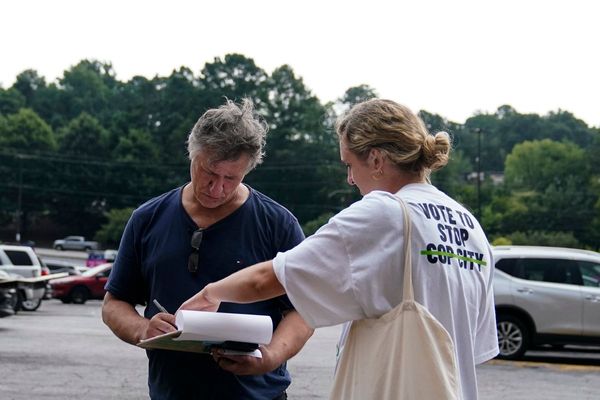
Welcome to Moving the Goalposts, the Guardian’s new (and free) women’s football newsletter. Here’s an extract from this week’s edition. To receive the full version once a week, just pop your email in below:
It has been a long journey but here we are, in 2022, with a Women’s European Championship about to start in England at a sold-out Old Trafford – and it is my job to write about it. When I grew up, in the late 1990s and early 2000s, that seemed an impossible dream.
Back then women’s football and women in football were simply not visible. No matter how much time I dedicated to learning, analysing, writing and being consumed by the game, thinking about a career in the sport as a young girl – however that might look – never seemed a viable choice.
So when I was asked to write about my emotions as the tournament is about to start I honestly didn’t know where to begin. It is so hard to describe how I am feeling right now on the eve of a home European Championship. That is a slight problem for a writer – my entire job is literally to find the words. But at this particularly poignant moment in my career they are hard to come by. But I will do my best.
My journey into journalism has been far from linear. I am certainly not unique in the role that football has played in my life. For as long as I can remember, the sport has guided, lifted and influenced me in ways beyond what happens on the pitch. It is a part of my identity. It gave me a tribe to be a part of in a world in which I, at times, struggled to belong.
In the past 20 years the whole landscape has completely changed. The last time England hosted the Euros, in 2005, many would have never known the tournament was on. Held in the north-west of the country, Hope Powell’s part-time outfit were talented, featuring players such as Kelly Smith, Rachel Yankey, Fara Williams and Alex Scott. It saw a 17-year-old Karen Carney break out on to the international scene but it would still be a long while before the sport really established itself.
London 2012 altered the playing field for the women’s game in this country, a catalyst for everything that has happened in the sport since. You could feel it in the atmosphere when Team GB beat Brazil in front of more than 70,000 at Wembley; remembering that roar when Steph Houghton hit the back of the net still sends shivers down my spine.
It also altered things personally; a moment that changed the trajectory of my career. What started out as a hobby and a thirst for knowledge turned into a passion project as I and my partner, Rachel, began GirlsontheBall.com. Our aim was to bring women’s football to more people and tell the stories of the players who have dedicated their lives to the game both through the written word and various digital formats.

That “hobby” – I am a bit loth to call it that because it was more like a second job worked around full-time employment – has now turned into a full-time career. Women’s football’s growth and popularity have seen it professionalise on and off the pitch, providing opportunities for so many that the teenage me could only dream of. The thoughts that I write down and the stories that I get to tell are now published fortnightly in a national newspaper. It is little wonder that I still have to pinch myself at times to remember that this is real.
Tournaments have come and gone in between, each providing its own significant milestone. At Euro 2013 Germany lifted the title for the eighth time, beating Norway in front of more than 41,000 people in Sweden. It was our website’s first major championship and one that led to the end of Powell’s 15-year era in charge of England, who finished last. Two years later was our first World Cup overseas, a month spent traversing Canada from east to west covering the Lionesses’ advance to the semi-finals, only to endure heartbreak against Japan with a 92nd‑minute own goal from Laura Bassett.
Back to the European Championship in 2017, we spent the summer swept along by a sea of orange dancing to Links Rechts and accompanying Sarina Wiegman’s Dutch side to the trophy. It was one of those magical underdog stories that only sport can serve up. Next came the World Cup in France. England again fell at the semi-final hurdle but it was a competition that propelled the sport further into the hearts and minds of the fan. I fully believe that the privilege of experiencing all of these moments first-hand, the highs and lows and everything in between, has developed me in the way I both understand and write about the game.
And so we come to Euro 2022, my fifth international tournament and one in my own back yard. The words I settle on are: surreal, exhilarating, full of promise and at times, if I’m being honest, a prospect that scares the life out of me (in a good way). It has the potential to launch this game to a different stratosphere, visible to the hundreds of thousands that will turn out in the stadiums and the millions that will have it played into their TV screens across the world.
Over the next three weeks we will see the best talent this sport has to offer grace our pitches – Ada Hegerberg, Vivianne Miedema, Pernille Harder, Lauren Hemp; the list is endless – creating priceless memories to last a lifetime. The opener between England and Austria in front of a sold-out Old Trafford and a Wembley final full to capacity are once again those moments that were unfathomable not too long ago. As I sit there, absorbing it all, writing and creating for my job, I will remember that young girl who, because of this game, has seen her dreams turn into reality.
Recommended viewing
Botswana’s Refilwe Tholakele dispatched this fine curling effort in her side’s 4-2 win over Burundi. Meanwhile, England’s Grace Clinton showed all her class with this deft turn and finish as her side competed in the Under-19 Euros.
𝐀 𝐒𝐄𝐍𝐒𝐀𝐓𝐈𝐎𝐍𝐀𝐋 𝐒𝐓𝐑𝐈𝐊𝐄! 💥#TeamBotswana’s Refilwe Tholakele wins our Goal Of The Day! ⚽️#TotalEnergiesWAFCON2022 | #EmpoweringOurGame | @1xBet_Eng pic.twitter.com/ZMhky31gGM
— #TotalEnergiesWAFCON2022 (@CAFwomen) July 4, 2022
Got a question for our writers – or want to suggest a topic to cover? Get in touch by emailing moving.goalposts@theguardian.com or posting BTL.







